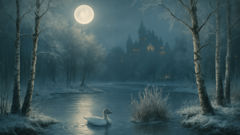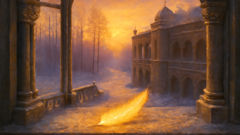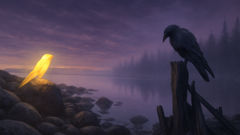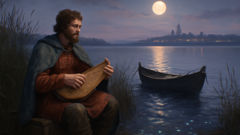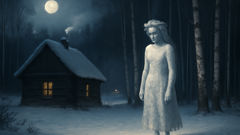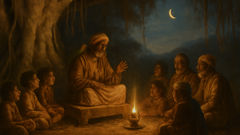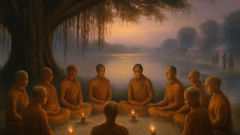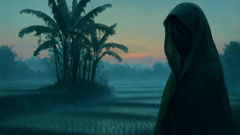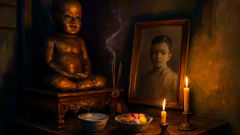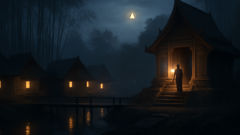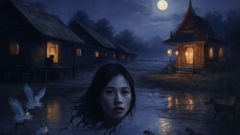Introduction
Nestled high in the misty folds of Colombia’s Altiplano Cundiboyacense, Lake Iguaque is more than a mere basin of crystalline water. To the Muisca, the indigenous people who flourished long before the arrival of conquistadors, this sacred lake is the cradle of existence. Here, amid lush emerald slopes and the persistent hush of ancient forests, the veil between worlds feels thin. The landscape breathes with myth, and every ripple, every whisper of wind, carries stories older than memory. It was at Lake Iguaque, according to Muisca tradition, that life began—not with a violent clash or a bolt from the sky, but with a quiet emergence: a woman stepping from the water’s shimmering surface, carrying a child at her breast. This woman was Bachué, the revered mother goddess, whose name means “the one with the naked breast.” She is at once creator and nurturer, a being woven from earth and water, her presence echoing in every leaf, every mountain breeze. Her myth tells of a world shaped by care and wisdom, of a people born not from conquest, but from the gentle guidance of a mother’s hand. In the hush before dawn, as the mist rolls across Lake Iguaque and the first birds begin their songs, the story of Bachué feels as real and tangible as the stones beneath your feet—a living legend whispered by the land itself.
The Sacred Waters: Bachué’s Arrival
Long before maps bore names or boundaries, before stone roads or fields of golden maize, there was only water, earth, and sky. The highlands of the Andes slumbered beneath the gaze of ancient stars, their rolling emerald slopes blanketed in fog. Lake Iguaque sat at the heart of this world, a silver mirror rimmed by forests thick with bromeliads and orchids. For the Muisca, it was the navel of creation, a place where life’s first breath was drawn.
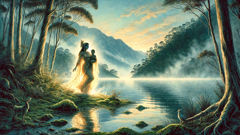
It was here, in the earliest dawn, that the waters began to stir. From their depths rose Bachué, her presence at once gentle and commanding. Her skin glistened like dew on mountain grass. Her long black hair tumbled down her back, crowned with delicate flowers found only at the lake’s edge. In her arms, pressed to her breast, was a child—a boy, quiet and wide-eyed, his gaze reflecting both innocence and ancient knowledge.
The creatures of the forest sensed her arrival. Birds hushed their calls, deer paused mid-step, and even the wind seemed to bow as Bachué set her bare feet upon the muddy shore. With each step she took, green shoots sprang from the earth, and the air filled with the scent of new growth. The mountains seemed to lean in, eager to witness this moment. She walked in silence, letting the child nurse at her breast, as if the act itself sowed the seeds of life into the world.
In those days, the land was empty of people but rich with possibility. Bachué wandered through valleys and over hills, accompanied by the soft song of running water and the quiet laughter of her child. With every place they rested—beside rivers, under the boughs of ancient trees—plants grew taller, the earth grew softer, and animals multiplied. The child grew, too. Years seemed to pass in cycles of sun and moon, yet Bachué did not age, nor did her gaze ever dim.
The Muisca believed that Bachué’s walk through their homeland was not random. Each place she touched became fertile, each stream she bathed in grew clearer. She taught the animals to find their mates, taught the birds to sing their unique songs. She whispered to the stones, shaping valleys and smoothing hills, making the land ready for those yet to come. Her power was quiet and persistent, more like the slow turning of seasons than the flash of lightning. She was not only mother to the child at her breast but mother to every living thing that blossomed in her footsteps.
A People Are Born: Lessons and Life
As the child at Bachué’s side grew from a babe into a boy and then into a young man, the world itself ripened. The slopes above Lake Iguaque, once silent, now hummed with life. The air was thick with birdsong and the sweet scent of blooming frailejones. Yet the land was still empty of people—no laughter echoed in the valleys, no hands turned the soil.
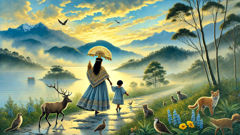
The time came when Bachué understood that her purpose was not merely to wander but to fill the world with her children. In a manner that was both miraculous and sacred, she and her son became the first parents of humankind. Their union was not born of passion or desire but of necessity and cosmic design—a harmony that would echo through all generations. The Muisca saw this not as a scandal but as the purest act of creation, blessed by the very forces that shaped the mountains.
From their union were born the first Muisca people. Children came in pairs and trios, their eyes bright as the lake’s surface at dawn. Bachué taught them how to plant maize and potatoes in neat rows on terraced hillsides, how to weave baskets from reeds and spin soft cotton into cloth. She showed them how to read the sky for signs of rain, how to craft gold into spirals and sunbursts—symbols of eternity and light.
The new people gathered around Bachué as students around a wise teacher. She spoke not only of how to live, but why to live. She taught them respect for the animals and the land, reminding them that every tree felled and every river crossed should be honored with gratitude and care. She spoke of balance—the need to give as much as they took, to listen as much as they spoke.
The people flourished. They built villages of circular huts with thatched roofs, their walls painted in ochre and indigo. They fashioned flutes that mimicked the calls of night birds and danced in the moonlight on festival nights. Their lives were woven together by kinship, tradition, and reverence for Bachué, whom they called Chía—the moon. Every harvest, every birth, every wedding was an echo of her original blessing. And through it all, Bachué remained at their side, a living goddess who guided with patience and love.
Return to the Lake: Transformation and Legacy
Generations passed beneath the watchful eye of Bachué. Her children’s children spread across the highlands, building new villages and filling the valleys with laughter and music. The land grew abundant—maize swayed in golden waves, emerald forests teemed with life, and the lakes shone like polished jade under the changing sky. Through it all, the people remembered their origins: the woman who emerged from Lake Iguaque, bearing a child and hope in equal measure.
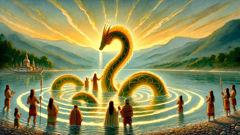
Yet even a mother goddess cannot stay forever. As time wore on and her people became wise and self-sufficient, Bachué sensed her task was nearly complete. Her children now honored the earth, respected one another, and lived in harmony with the world she had shaped. In the cool dawn, when mist still curled low over the water, Bachué gathered her people one last time.
She stood before them radiant as ever, her eyes reflecting both pride and sorrow. She told them that her work was done—that they must now guide themselves, relying on the wisdom she had sown in their hearts. She promised that whenever they needed guidance, they could look to Lake Iguaque and remember her teachings.
As the people watched, Bachué and her son walked back to the water’s edge. The air thickened with anticipation, and the birds fell silent. With gentle steps, they waded into the lake, their figures growing indistinct in the morning mist. When they reached the deepest part, a transformation took place: Bachué and her son dissolved into two great serpents, symbols of renewal and the endless cycle of life. Their bodies shimmered beneath the surface before vanishing into the green depths of Iguaque.
From that day on, the Muisca revered Lake Iguaque as a place of pilgrimage. They believed Bachué still watched over them in serpent form, protecting the land and its people. Every ritual, every planting season, every moment of gratitude was offered to her memory. Even centuries later, as empires rose and fell, as new faiths swept the land, the legend of Bachué endured—a testament to a time when the world was young, and life began at the gentle hand of a mother.
Conclusion
The story of Bachué is not merely a tale etched into the stone of ancient memory—it is a living legend that pulses in the very heart of Colombia’s highlands. Her journey from the sacred waters of Lake Iguaque to the nurturing embrace of motherhood, and finally to her return as a serpent, captures the Muisca vision of a world balanced by care, gratitude, and renewal. Even as centuries pass and new voices fill the valleys, the spirit of Bachué endures: in every harvest gathered with respect, in every child taught to honor the earth, in the hush that falls over Lake Iguaque at dawn. Her myth is a gentle reminder that creation is not a single act but an ongoing dialogue between people and the land—a legacy of harmony that survives wherever the story of Bachué is told.


